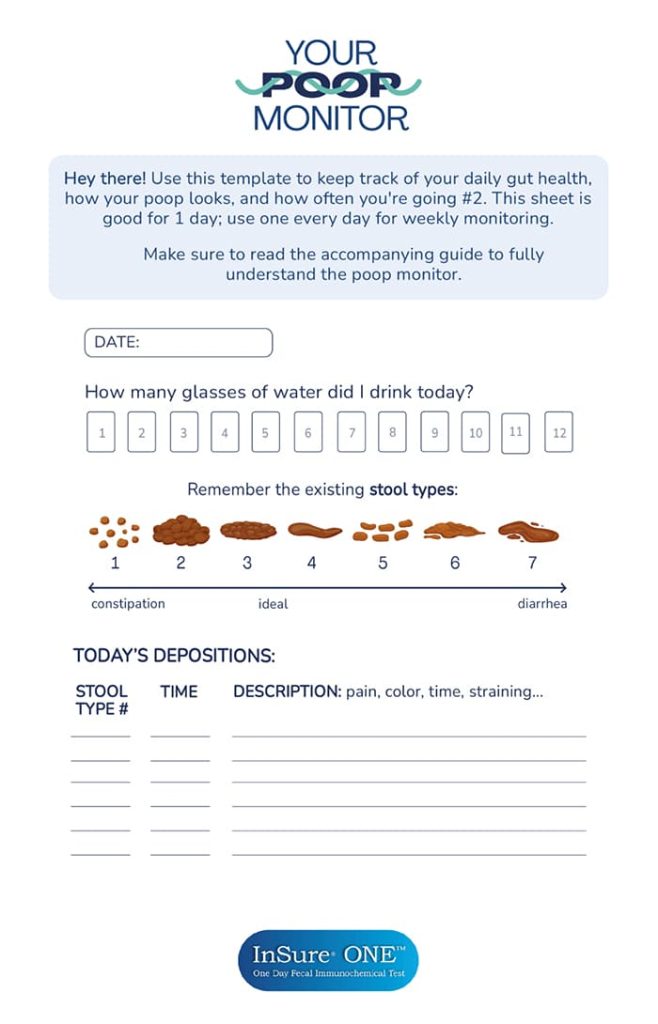When it comes to your health and well-being, being proactive is the most important thing you can do. Rather than wait for a disease to progress to a point where it causes symptoms––which may also be when it is harder to treat––proactivity allows you to catch diseases early, when prevention and treatment are still possible and, often, less draining.
One method of proactivity that is easy to perform is colon screening through a fecal immunochemical test (FIT). Completed at home, this test can screen for blood in the stool, which may be a sign of lower GI disorders such as colitis, Chron’s disease, and colorectal cancer. Even better, the FIT is as easy as one (read instructions), two (collect sample), three (ship sample back).
Let’s learn more about the FIT and who should get a colon screening.
What is a Fecal Immunochemical Test (FIT)?
A Prueba Inmunoquímica Fecal is a stool-based test that detects microscopic blood in the stool, or blood that you wouldn’t be able to see just by looking. It is an annual test carried out to screen for lower GI diseases and abnormalities, and it can be completed at home.
It’s important to note that a FIT does not diagnose cancer. Instead, it can indicate that further testing, such as a colonoscopy, should be conducted.
Beyond the FIT’s ability to detect lower GI abnormalities, it has two additional benefits: it is compatible with medications, and food does not interfere with its results, so no dietary changes are required. These features ensure more accurate results and fewer false positives, making the FIT more reliable than other screening tests.
How Does a FIT Work?
The FIT utilizes antibodies to detect blood in the stool.
Your stool is what is left over from your food after it has traveled through the entire digestive system, including your colon. As such, your stool can hold clues about what is happening inside your body.
In most cases, colorectal cancer manifests in polyps, which are growths on the lining of the colon. While not all polyps indicate cancer, precancerous and cancerous polyps are more likely to bleed. Since your stool passes by these polyps, that blood can end up in your stool. Then, by detecting blood in your stool, a FIT can notify you of the possibility of precancerous or cancerous polyps.
To complete a FIT, a stool or water-based sample is collected. The water-based sample is collected by brushing the water around the stool with a brush for 5 seconds and then brushing the sample on the testing card—the sample, whether stool or water-based, is then sent to the lab.
At the lab, antibodies that bind to hemoglobin, the iron-containing protein found in blood, are used to determine if blood is present in the sample. The FIT only detects intact hemoglobin, though, not partially digested, which would be blood originating in the upper gastrointestinal system. Because of this, the FIT only screens for blood in the lower intestines (i.e., the colon and rectum).
Who Should Get Screened for Colorectal Cancer?
It’s recommended that anyone between the ages of 45 to 75 be screened for colorectal cancer.
Until a few years ago, it was recommended to start colorectal screening at age 50. However, in 2018, the American Cancer Society lowered the start age for those at an average risk of colorectal cancer to 45 since it is becoming more prevalent in young and middle-aged individuals.
Additionally, colorectal cancer rates have decreased for those over 50 (likely because of screening, which can detect abnormalities early) but have increased by 51% since 1994 for those under 50.
This data emphasizes the importance of starting screening at 45 (or earlier if you’re at a higher risk). Options for colorectal screenings include a FIT or stool-based fecal occult blood (gFOBT) test every year, a stool sDNA test every 1-3 years, a flexible sigmoidoscopy every 5 years (or every 10 years if a FIT is also done each year), a CT colonography every 5 years, or a colonoscopy every 10 years.
If you’re interested in screening through a FIT, keep in mind that it is best for those who are at an average risk for colon cancer. Those with a higher level of risk may be asked to begin screenings sooner through an alternative form of screening.
Those at an average risk of colon cancer:
- Have no family history of colon cancer
- Have never had a colonoscopy that found precancerous or cancerous polyps or tissues
- Don’t have a personal history of inflammatory bowel diseases such as Crohn’s disease or ulcerative colitis
- Don’t have a hereditary colorectal cancer syndrome
- Haven’t received radiation to the abdomen or pelvic area to treat prior cancers
Additionally, since no test is 100% accurate, and the polyps might not be bleeding as the stool passes through, regular screening is crucial to detect abnormalities.
What Do the Results of A FIT Mean?
The results from your FIT will either be:
- Normal/Negative: no blood was detected in the stool
- Abnormal/Positive: blood was detected in the stool.
Just because a FIT detects blood in the stool does not mean that you have colon cancer. However, the results can help prompt other forms of testing, like a colonoscopy, which can then be used to diagnose the root cause of the blood in your stool.
Your stool may contain microscopic amounts of blood if you have:
- Inflammatory bowel disease
- Hemorrhoids
- Polyps (non-cancerous growth)
- Precancerous polyps
- Stomach ulcers
- Colon cancer
However, it’s also important to acknowledge the possibility of false positives, in which the test incorrectly detects blood. This is why additional testing is ordered after a positive result—to determine if it is a true positive and diagnose the cause of the blood.
Be Proactive in Your Colorectal Health: Get Screened Today
Proactivity is the best attitude you can adopt if you want to take charge of your health. This can take on many forms, such as modifying your diet to support lifelong health, getting regular exercise, and completing regular screenings for age-related diseases such as cancer.
A FIT is an easy and convenient way to screen for colorectal disorders, requiring only a few minutes of your time and capable of being completed at home. The security it grants in your health, though, and its ability to prompt early (and more successful) treatment is priceless.
Empower yourself with essential insights needed for proactive colorectal health and learn more about our InSure ONE Test as you start your health journey.
References
- NCI Dictionary of Cancer Terms. (2024). National Cancer Institute; Cancer.gov. https://www.cancer.gov/publications/dictionaries/cancer-terms/def/immunochemical-fecal-occult-blood-test
- Fecal Occult Blood Test (FOBT). (2022). Medlineplus.gov. https://medlineplus.gov/lab-tests/fecal-occult-blood-test-fobt/
- Fecal immunochemical test (FIT): MedlinePlus Medical Encyclopedia. (2021). Medlineplus.gov. https://medlineplus.gov/ency/patientinstructions/000704.htm
- Andrew M.D. Wolf, Elizabeth T.H. Fontham, Church TR, et al. Colorectal cancer screening for average‐risk adults: 2018 guideline update from the American Cancer Society. CA: A Cancer Journal for Clinicians. 2018;68(4):250-281. doi:https://doi.org/10.3322/caac.21457
- American Cancer Society Updates Colorectal Cancer Screening Guideline. (2018). American Cancer Society MediaRoom. https://pressroom.cancer.org/releases?item=770

